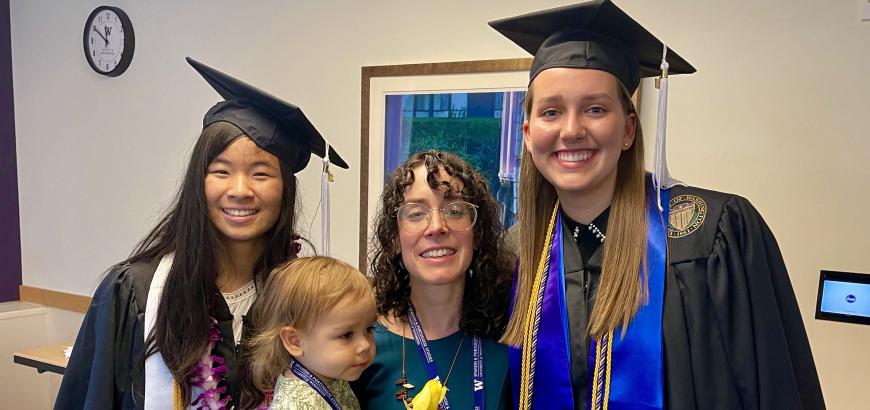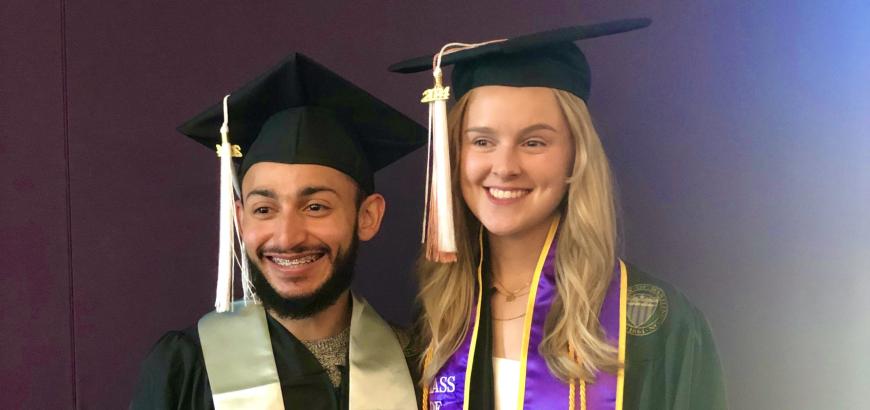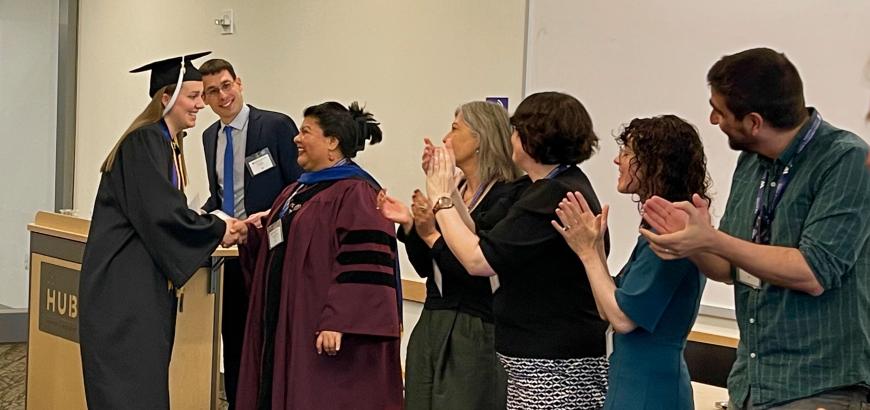From the Chair (slightly edited version of remarks first delivered at the graduation ceremony):
Congratulations to our Graduates!
All of our graduates—just as all of our faculty—got to where they are today from different points of origin, with our different histories and our different challenges and our different hopes and our different fears, but with a shared desire to...
... well, let me be honest: sometimes our shared desire whispers that what we really need to do is to make it through the end of the day, or the week, or the month, or the quarter, or the year. And that's Ok. We're all just trying to function, and many days, functioning is more than enough.
But sometimes, our desires speak a little more loudly, and they call out for learning about the world, and about ourselves, and about people very much not like ourselves at all.
They call out for learning about how things sometimes work and why things sometimes don't work and how we are to respond to either situation—be the context healthcare, or public policy, or law, or business, or education, or the environment.
They call out to us to build bridges—both literal and metaphorical.
They all out to us to explore the heights and depths and breadths of our world and its challenges; and of our humanity, and its challenges, as well.
They call out to us to approach difficult and sometimes frightening problems with boldness and wisdom and bravery, and to treat others with the kindness and patience and understanding that we ourselves yearn to receive.
They call out to us to remember that the world is not a time, multiple-choice test, and that while we might feel pressed to quickly swipe left or right or hurriedly give a thumbs-up or thumbs-down in some self-serving act of performativity, what is really called for is quiet, and slowness, and reflection.
A few things in this world need to be done quickly, it's true. But most things do better with a little time for thought.
And that, I think, is one of the most important gifts of the university: time for thought.
Because I am an historian at heart, I had planned here to give a brief history of the modern university, because I figured: what could be more exciting than that?
I was soon informed by both friends and family that a lot of things could be more exciting than that, so I will only point out that the University of Salamanca, in Spain, was founded in 1218, making it both the oldest university in the Hispanic world and the fourth oldest university in the world in continuous operation—after only the University of Bologna, the University of Oxford, and the University of Cambridge.
The University of Coimbra in Portugal was founded in 1290, and is the seventh oldest university in the world.
The University of San Marcos in Lima, Peru, was founded in 1551, and is the longest-running continuously operating university in the Americas.
Harvard University, by comparison, was founded 85 years later, in 1636.
The University of Washington was founded only in 1861.
We're the Dawg Pack, for sure—but in the grand history of what a university is: we're only pups.
To our Grads:
In achieving the goals that have brought our graduates to these days, you have entered a long and lasting history of people much like yourselves: young, hopeful, curious, anxious, sometimes excited, sometimes bored (Yes, we can tell!) and often probably just really... tired and a little bit dehydrated (drink more water, always!).
Grads, you've had a hard go of it. You probably entered the UW in the Fall of 2020, during the greatest global health crisis in my lifetime—and so certainly in yours. It was a horrible, frightening, isolating time. You were deprived of your high school graduation—making this day, and this weekend, all the more important—and you entered what should have been a community at a time of forced remoteness.
It was horrible. We know it was horrible. And it's probably the case that we should have said this more openly and honestly than we have. But I'm saying it now.
It was horrible.
It was tough.
But Grads (and their families): you were tougher. The class of 2024 constitutes some of the toughest, kindest, most driven students I have met in my 24 years at the University of Washington.
And I applaud you. And we applaud you.
As an aside, about 80% of our graduates today are double majors, coupling a degree in Spanish with degrees in Business, Public Health, Environmental Studies, English, History, and more. The message is clear: Spanish belongs everywhere.
Before I bring my remarks to an end, I would like to share some of the amazing strengths, successes, and events of our department over this past year.
First, I would like to announce that our department now has a "Friends of Portuguese Studies" endowment, thanks to the extreme generosity of Karen Tsao, who is with us today (Hi, Karen!). This endowment will help strengthen and grow our Portuguese Studies Program, and our department is grateful for this ongoing relationship, and indeed for all of our donors.
Second, I would like to publicly congratulate Professor Jorge González Casanova on his promotion to Full Teaching Professor. This is a well-deserved accomplishment.
Third, I want to share that this past year, our department launched a new "Undergraduate Essay Prize," the first undergraduate essay prize at the UW for papers written in languages other than English. This was a tremendous accomplishment, and I thank all faculty who either submitted nominations or who agreed to judge the the submissions (all of which were excellent).
Related to this, and by way of conclusion, I simply want to thank the department as a whole: all of my colleagues here, our amazing departmental staff, all of our students and all our students parents, families, and friends. We are a strong department that is only getting stronger, and we are doing this so well because we are doing it together. Gracias.
And now, one final time: Congratulations, Everyone!


